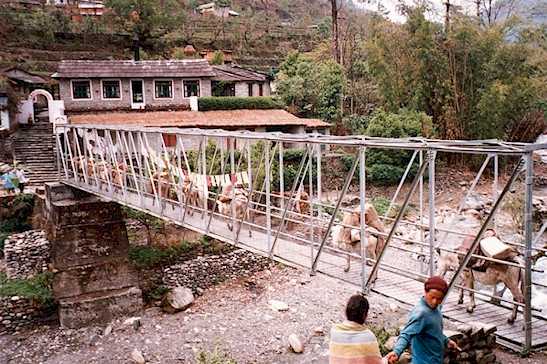
Nepal RPCV Patrick Livingston started international program to exchange ideas about water quality
Grant brings 'U' to Nepal
Fulbright-Hays Group Projects Abroad program grant covers research
By EVAN RONDEAU
The State News
TYLER SIPE · The State News
Entomology professor Frederick Stehr holds a Luna Moth, which can be found throughout Michigan in June. Stehr, who focuses on moths, will be traveling to Nepal with five other MSU faculty and staff members.
When Patrick Livingston conceived of an international program to exchange ideas about water quality, he had no idea the thought would lead him to Nepal.
The recently retired MSU Extension agent said he first had the idea while developing a water-quality testing program for middle school children in Macomb County. But Livingston said he wanted to broaden the concept after having visited Nepal as a Peace Corps volunteer in the 1970s.
"I decided to physically take that program to Nepal," Livingston said.
In 2000, Livingston traveled to the country and met with middle school teachers in Pokhara, a city about 120 miles west of the capital, Kathmandu. He taught the teachers about water-quality testing and encouraged them to conduct the tests with their students.
After returning to Michigan, Livingston contacted Nepal native Murari Suvedi, assistant dean of MSU's Office of International Studies and Programs. Suvedi put Livingston in touch with Nepalese educational administrators, who helped recruit teachers for Livingston to work with. He then linked Nepalese and Michigan teachers to share testing data.
Now, five MSU faculty and staff, along with 10 Michigan K-12 teachers, will leave on Saturday for a three-week trip to determine the success of the previous trips and to exchange photos, videos and water-quality data.
During the trip, group members will visit schools, spend time with host families and take several field trips, including visits to Buddhist monasteries. Participants will spend about half of the trip in Pokhara, and the other half in Kathmandu. They will attend a number of educational seminars, where they will learn about the Nepalese environment, Buddhist religion and culture. They also will make a one-day excursion to Bangkok, Thailand, before returning Nov. 2.
The group is funded by a $60,000 Fulbright-Hays Group Projects Abroad program grant. The money covers the cost of the international travel, meals and lodging in hotels and with host families. The teachers' salaries will be provided by their respective schools.
Suvedi submitted the grant proposal in May of 2002, and it was accepted in August of the same year. Original plans called for an October 2002 departure, but political turmoil in Nepal delayed the trip.
Provost Lou Anna Simon said the grant reflects positively on the strength of the faculty who submitted it, as well as the quality of the idea in the proposal.
"Michigan State has always been committed to helping community schools," Simon said. "We always look to find ways to build bridges between projects overseas and teachers in Michigan."
Suvedi said the trip will provide a cultural experience for all participants.
"Our professors and school teachers will see the political and environmental systems in Nepal and they can bring that experience back and share it with students in their classrooms, and with clubs and organizations," Suvedi said. "That way, Michigan students and citizens can be better informed about the situations in Nepal."
Each of the K-12 teachers in the group will create a lesson plan to be used as part of a study guide for students. The guide will serve as a model for teachers to educate their students about Nepalese culture.
Upon their return, Suvedi said group members will evaluate the success of the program, which will include discussion on each participant's experiences and how to implement a Nepalese-focused curriculum into K-12 education.
And some group members are already getting excited about their upcoming experience.
Entomology professor Fred Stehr, curator of the trip's insect collection, said he is excited about bringing back Nepalese insects and comparing them to their Michigan counterparts.
"I'm hoping some of the (Nepalese) students will be able to provide a comparable collection of Nepalese insects," Stehr said. "I want to show students here some insects in the same family, but from different parts of the world."
Marietta Crabtree, biology teacher at Shelby Junior High School and trip participant, said she hopes students will recognize basic concepts of environmental protection.
"There's a common stewardship among people to care for their environment," Crabtree said. "Hopefully, what we're doing is helping to facilitate the process with students."
Evan Rondeau can be reached at rondeau1@msu.edu.
